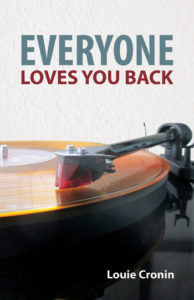Louie Cronin: Everyone Loves You Back
November 20, 2016 by David
Filed under Fiction, WritersCast
 Everyone Loves You Back – 9781941576229 – Gorky Press – paperback – $15.95
Everyone Loves You Back – 9781941576229 – Gorky Press – paperback – $15.95
I very much enjoyed reading this well written and humorous novel. It’s set in Cambridge (“our fair city” MA), and depicts the sort of culture clash that has occurred all over America as livable cities are reinhabited by the latest version of what we used to call yuppies. These newcomers to city neighborhoods have completely different values – and economic realities – than the folks who grew up there. It’s a rich environment for fiction too. So this is a novel that will likely resonate for many readers on a sociopolitical basis, in addition to its deft handling of the relationships between the sexes. And because Cronin comes from public radio – she was a producer and writer for the much loved and missed Car Talk – the setting of this novel is one that many of us whose industries have undergone wholesale modernization, can appreciate as well.
Is there a category of novel for “late Baby Boomer” coming of age stories set in the present? I am not well enough read to say. The publisher calls this a “coming of middle-age novel,” which seems apt. I do think that especially for readers of “a certain age” this book could become a favorite. And you don’t have to struggle with a changing neighborhood or have issues with your love life to appreciate the joyfulness and humor of this novel.
Louie and I had a fun time talking about her book, her work and the way she was able to inhabit her male main character, a feat of imagination and courage for any novelist.
Louie Cronin is a writer, radio producer, and audio engineer. She worked as a producer/writer for Car Talk on NPR for ten years. Her fiction and essays have been published in a variety of magazines and journals. She is not the technical director for PRI’s The World and lives in Boston with her husband, the sculptor James Wright.
Podcast: Play in new window | Download
Publishing Talks: David Wilk interviews DeWitt Henry of Ploughshares
February 10, 2014 by David
Filed under Publishing History, PublishingTalks
 Publishing Talks began as a series of conversations with book industry professionals and other smart people about the future of publishing, books, and culture. As we continue to experience disruption and change in all media businesses, I’ve been talking with some of the people involved in our industry about how they believe publishing might evolve as our culture is affected by technology, climate change, population density, and the ebb and flow of civilization and economics.
Publishing Talks began as a series of conversations with book industry professionals and other smart people about the future of publishing, books, and culture. As we continue to experience disruption and change in all media businesses, I’ve been talking with some of the people involved in our industry about how they believe publishing might evolve as our culture is affected by technology, climate change, population density, and the ebb and flow of civilization and economics.
Recently, the series has been expanding to include conversations about a wider range of subjects beyond my initial interest in the future of publishing. I’ve talked with editors and publishers who have been innovators and leaders in independent publishing in the past and into the present, and will continue to explore the past, present and future of writing, books, and publishing in all sorts of forms and formats, as change continues to be the one constant we can count on.
It’s my hope that these conversations can help us understand the outlines of what is happening in publishing and writing, and how we might ourselves interact with and influence the future of publishing as it unfolds. This week’s interview reflects my interest in comic art, illustrated story telling and new technology as a platform for expanding story telling in interesting and challenging ways.
Ploughshares is one of the great literary magazines of the last fifty years. Founded in 1971 in Boston by writer, teacher and scholar DeWitt Henry and writer and bar owner Peter O’Malley, it has gone on brilliantly from very humble beginnings to publish an extraordinary range of writing. Founded in a bar called the Plough and the Stars in Cambridge, Massachusetts, Ploughshares to give the young and upcoming writers of its time a voice and a platform, the magazine has been a literal breeding ground for great writers of fiction, poetry and nonfiction as well.
One of its innovations was to invite writers to guest edit individual issues. The list of editors is pretty incredible, including Seamus Heaney, Derek Walcott, Rita Dove, James Alan McPherson, Philip Levine, Gerald Stern, Raymond Carver, Rosellen Brown, Maxine Kumin, Donald Hall, Marilyn Hacker, Mark Doty, Richard Ford, Sherman Alexie, and many others. Ploughshares editors have received almost every award given in American writing. Throughout its now celebrated history, Ploughshares has managed to maintain a high level of excellence in writing and has avoided being trapped by the narrowness of a particular school or narrow vision of what American writing can be. It has consistently nurtured new talent, and continues today to bring attention to new writers. And lately, Ploughshares has broadened the definition of what a literary magazine can be with an innovative series of ebooks called Ploughshares Solos.
Interviewing DeWitt Henry about the history of the magazine, bis work as editor and writer, and the current and future of Ploughshares was a great pleasure for me. Having been involved in literary publishing and distribution myself, I know how incredibly difficult it is to sustain both the artistic and structural vision in this kind of publishing. Ploughshares truly represents an extraordinary accomplishment for those who have worked on it, published in it, and of course read the magazine during the many years of its existence.
There’s an excellent history of the magazine on it website. And you might want to visit DeWitt Henry’s own website to learn more about him as well. He is am accomplished and interesting writer too. Alert to listeners, as this is part of an effort to document the oral history of literary publishing, this is a longer than usual podcast – but worth your time to listen.

Podcast: Play in new window | Download
